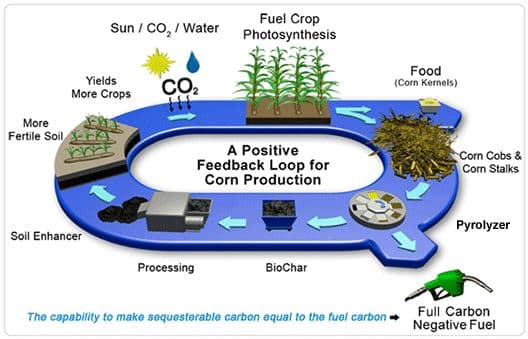Cool Planet’s Green Fuels and Biochar Fertilizer
Table of contents

According to a fertilizer industry guide published by Marketline last year, the global fertilizer market had total revenues of $183.3 billion in 2012. Various reports from the Canadian government state that fuel and fertilizer costs accounted for 15%-18% of total Canadian farm expenses in the years 2009 through 2011. Not having to pay for fuel and fertilizer would be a very appealing value proposition for farming operations that are dealing with increasingly thinner profit margins. Cool Planet Energy Systems is a company that is developing a very compelling solution that will provide both fuel and fertilizer to a farm onsite.
About Cool Planet Energy Systems
Founded in 2008, California based Cool Planet Energy Systems has raised $176 million so far from the likes of North Bridge Venture Partners, BP, Google Ventures, Energy Technology Ventures (GE, ConocoPhillips, NRG Energy), UBS, and Goldman Sachs. The former Chairman, President and CEO of ConocoPhilips, Archie Dunham, is on the Cool Planet Board of Directors. Cool Planet is a developer of small-scale biorefineries for the conversion of non-food biomass (wood chips, corn cobs, and stalks, palm plantation waste, etc.) into biofuels and soil enhancing biochar. The biofuels produced are identical in chemical composition to fossil fuels and the biochar is used as a fertilizer.
The Process Life-Cycle
Biomass is processed through a mechanical system that uses pressure and heat to create streams of useful hydrocarbon components. Proprietary catalytic conversion processes convert these useful hydrocarbon components into different types of fuels. The leftover plant matter is a solid carbon form called biochar which is highly porous and has beneficial water and nutrient retaining capabilities. The entire life-cycle is best explained in the diagram below:

Cool Planet says that it intends to mass produce refining equipment that is modular and built on moveable skids making the solution easily movable and scalable. The production plants will be 100 times smaller than a typical oil refinery, and the prefabricated systems can be moved near the biomass sources saving on transportation costs. The technology used in the refining equipment is based on 14 awarded U.S. patents.
Cool Terra™
The superior properties of biochar as a fertilizer are key to this value proposition as biochar would need to yield results that would decrease or eliminate the need for chemical fertilizers in order to provide the full spectrum of cost savings. Cool Planet thinks it will. In an article last month by The Times-Picayune, CEO of Cool Planet Howard Janzen stated that they aim “…to produce gasoline priced at $1.50 per gallon once production is scaled up over coming years…” and that “…there is real potential that biochar is going to be perhaps as valuable as the fuel we produce.” Fi eld trials of the company’s Cool Terra™ biochar with commercial growers have shown yield improvements of more than 50% with signi ficant reductions in fertilizer and water use. For those of you who want to trial the product yourselves, one cubic foot bag of biochar can be purchased on the Cool Planet website for $39.99.
Conclusion
In August 2013, Cool Planet announced that they would build three bio-refineries in Louisiana with a capital investment of $168 million. The first 10 million gallon bio-refinery is expected to be completed by the end of 2014. An article by Biofuels Digest states that company’s business model calls for developing 400 micro-refineries across the U.S. in the next decade. In order to deploy that many units, Cool Planet will need plenty of capital, and this self-described “pre IPO” company may look to an IPO soon to raise that capital.
Sign up to our newsletter to get more of our great research delivered straight to your inbox!
Nanalyze Weekly includes useful insights written by our team of underpaid MBAs, research on new disruptive technology stocks flying under the radar, and summaries of our recent research. Always 100% free.
















For a complete review of the current science & industry applications of Biochar please see my 2013 Umass Biochar presentation. How thermal conversion technologies can integrate and optimize the recycling of valuable nutrients while providing energy and building soil carbon, I believe it brings together both sides of climate beliefs.
A reconciling of both Gods’ and mans’ controlling hands.
Agricultural Geo – Engineering; Past, Present & Future
Across scientific disciplines carbons are finding new utility to solve our most vexing problems
http://www.trunity.net/files/236901_237000/236919/kinght2013-1.pdf
Thank you for the additional info Erich.